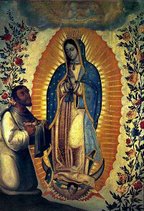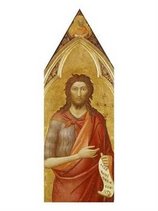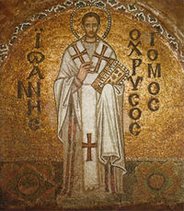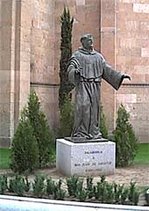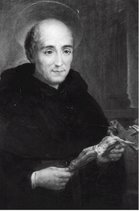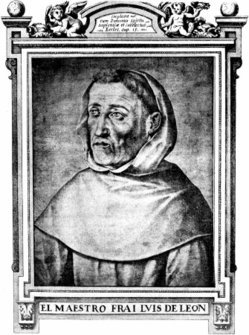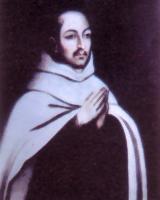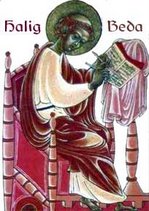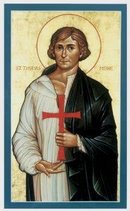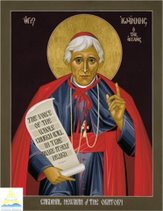Quevedo's last verses
Here is an extract from a story I wrote about Quevedo followed by a translation of what are thought to be the last verses he revised before his death.
In The Peace of These Deserts45
The ghost went on explaining himself as we continued on our zig-zagging path, “Ever since I put pen to paper I had roused anger in certain people. Some even went so far as forming the Tribunal of Righteous Revenge against my writings.46 So, I was often forced to retire to my tower of St. John of Abad to avoid unpleasantness.47 Which was fine by me because I enjoyed my solitude where I could write in peace.
“As I said, I had enemies in abundance but few real friends. Although sometimes the company of another is desirable. So on occasion I would play cards with the Duke of Medinaceli on his estate and engage in pleasant conversation. One night in particular we where deep into a game of Hombre.48 I believe the year was 1639 or so, I was leading the Duke with my last hand when out of nowhere a swarm of soldiers stormed the palace.
““What is the meaning of this?””
““Francisco de Quevedo y Villegas Gómez?””
““Yes.””
““I hereby place you under arrest by order of His Majesty King Philip IV.””
“Of course I knew it was his minister the Count-Duke of Olivares who was behind it all. We had fallen on bad terms since I began criticizing his politics. I saw them ruining Mother Spain, now reduced to a shell of her former self.49”
““So be it,” I said calmly and with that I was led away to a solitary castle of my order on the cold central plateau near León.50”
“By 1643, four years later, that dolt the Count-Duke of Olivares had fallen in disgrace, having since passed on, when I was finally released from my imprisonment. “Ten months of winter and two months of hell”51 as we say. How the cold of Castile got into my bones during those years! The chains chaffed at my skin, opening sores. I then retired to my Tower of Abad like Charles the Fifth to his monastery at Yuste.52 Defeated by life and fortune.”
“But the cold would still not leave my bones. Every member of my being was now as cold as ice. So I fled the chill to Villa Nueva de Infantes53 where I arrived more dead than alive.”
“One night in September, the year of Our Lord 1645, I sat a my desk preparing a book of my verse when a distant bell struck nine. I heard a horse galloping on the dusty plain. Clip-clop, clip-clop. I turned back to my work again as the pounding hooves seemed to come ever closer cutting through the night. Still unconcerned, I resumed my work hoping for posthumous glory. Closer, closer the hoof-falls came until they suddenly stopped. Relieved I turned my attention back to my work. Then I heard the neighing of a steed and the sound of a rider dismounting. Footfalls that could only come from massive boots sounded out in the night. And the rider like his horse came closer, closer . . .”
“Considering the matter to be more serious than I had suspected, I position myself strategically with my crutches. I was in a sorry state of decay. So I readied my steel as a loud pounding came at the door. Come what may.”
““Who goes there?” I called out. But the only answer that came was the howling wind.”
“Again the pounding came but much harder this time. I feared that the poor wooden door would not withstand much longer. Meanwhile my heart raced inside my chest as I readied my blade. Crack! A massive arm broke threw the door and tore it asunder. There stood a figure with a feathered hat and dressed in a black overcoat. On his feet were massive boots accompanied by punishing spurs. The intruder motioned toward me with an outstretched blade. Then I wondered whether the tortured spirit of the fencing hack Narvaéz had come back to prove himself. After all, I had revealed the stupidity of his method to everyone that night in the President of Castile’s house so long ago.54”
““So, Pacheco de Narvaéz, you’ve come at last. I heard you died forgotten and unsung. Which proves that the shortest distance between fame and oblivion is a straight line, eh?””
“There was no answer. The visitor beckoned once again with his blade at which point I administered a counter attack. The swordsman disengaged and almost threw me across the room but I stood my ground. I wasn’t a renowned swordsman for nothing. Still the battle was hard and at times the cold still clung to my bones. Yet I resisted and persevered.”
“I continued to fend off the intruder harnessing all my skill as a swordsman.
After what seemed like hours I looked to find my study was a mess with papers strewn about. I felt much weaker than before. Indeed, I felt I was fighting for my very life. At this point I wondered maybe it wasn’t Pacheco de Narvaéz after all . . .”
“Just then the stranger made a counter thrust and knocked my sword out of reach. I groped for it sadly as the black rider closed in. If I could only just . . . but I was too weak from sickness and age to do anything and lay helpless on the floor as he directed his blade towards my neck.”
“As a sign of victory he mockingly doffed his hat at me revealing a hideous skull underneath!”
“It wasn’t a stupid fencing master that had come calling that night. It was Death. Death had come for its own!”
You, oh wayfarer, listening to me now,
If you mean to obtain victory
Against the monster against whom you struggle;
You’ll make it so your memory goes on
To receive death,
That comes darkly and silently to unmake you.
Do not pay attention to anyone else,
For life flees step by step
Amidst false pleasures,
And dying you are born and living you die.
Tire, oh mortal,
In acquiring treasure and riches
For in the end, time must inherit thee
And all gold and silver be left behind.
Live for yourself if you can,
For if you die,
You only die to yourself alone.
Sólo la muerte . . .
Tú, pues, oh caminante que me escuchas,
si pretendes salir con la victoria
del monstruo con quien luchas,
harás que se adelante tu memoria
a recibir la muerte,
que oscura y muda viene a deshacerte.
No hagas de otro caso,
pues se huye la vida paso a paso;
y en mentidos placeres
muriendo naces, y viviendo mueres.
Cánsate ya, oh mortal, de fatigarte
en adquirir riquezas y tesoro,
que últimamente el tiempo ha de heredarte,
y al fin te dejarán la plata y oro:
vive para ti solo, si pudieres,
pues sólo para ti, si mueres, mueres.
45 See 33
46 Tribunal de la Justa Venganza contra los escritos de D. Francisco de Quevedo, maestro en errores, doctor en vergüenzas, licenciado en bufonerías, bachiller en suciedades, cátedra de vicios y Proto-diablo entre los hombres (1635) The Tribunal of Righteous Revenge against the writings of D. Francisco de Quevedo, master in errors, doctor in shamefulness, laureate in buffooneries, bachelor in dirtyness, chair of vices and foremost devil among men.
47 La Torre de San Juan de Abad. In Quevedo applied for the lordship over this small Manchegan town complete with imposing tower. He would spend his exiles there removed from the frantic life at court.
48 El Juego del Hombre “Man’s Game”- A popular card game of the time. Also known as Tresillo.
49 Felipe IV- El rey poeta- “The poet king”. Although more strong willed than his father Philip III, he enjoyed the finer things in life over the concerns of government like poetry, painting, plays, and many, many mistresses. As such the Count-Duke Olivares had free reign on government policies.
50 San Marcos, a residence of the Order of St. James where Quevedo was to stay under house arrest.
51 <
52 After years of leading wars in Italy and Northern Europe the Holy Roman Emperor Charles V retired to a monastery at Yuste in Extremadura where he spent his last days as a monk.
53 A city near San Juan de Abad.
54 Luis Pacheco de Narvaéz, fencing master of Philip IV, with whom Quevedo maintained a bitter antagonism. It is said that Quevedo challenged him to show off his fencing skills one in the President of Castile’s mansion. Quevedo humiliated Narvaéz by removing his hat with a quick motion of his blade. Pacheco is also said to have headed up the Tribunal of Righteous Revenge and made his own efforts to have Quevedo’s work reviewed by the Inquisition. He was a proponent of a technique called “The Mysterious Circle” which used complicated math and geometry in order to avoid an adversary’s blade. Quevedo made fun of this method in his satirical writings.







 The following is a short story from 1896 entitled
The following is a short story from 1896 entitled 



